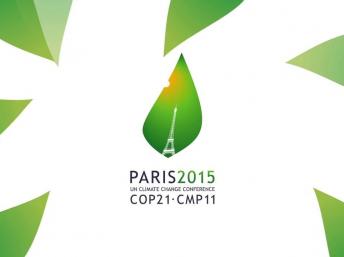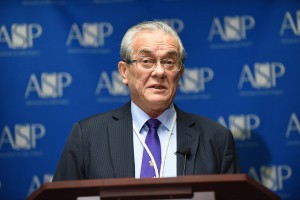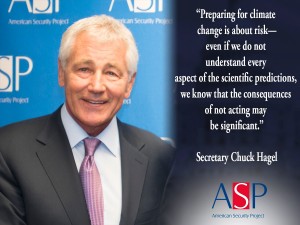
Paris Update: Climate Adaptation Builds Global Security
As the Paris COP climate negotiations continue, Secretary of State Kerry has announced an increased American pledge for adaptation aid to $800 million per year by 2020. As ASP’s CEO wrote in “Strengthening national security through climate resiliency,” funding for adaptation aid is costeffective because it will address the risks presented by climate change before American troops have to be deployed.
This must be more than simply a negotiating chip in Paris. Adaptation aid is important on its own as a way to ensure global security. When other countries fear the effects of climate change, helping prevent the worst scenarios can build goodwill beyond just climate preparedness it can build stronger diplomatic bonds across a range of national priorities.
 As an example of how this is more than simply goodwill, we should look to the Pacific. ASP hosted Foreign Minister Tony de Brum of the Marshall Islands on October 28, where he said that “A country’s security is a function of its location.” As a “large ocean nation,” not a “small island state,” de Brum explained the general fears the island population has in the coming decades if the world does not act on climate security. “We are literally at the mercy of rising waves,” he said. The U.S. is treaty-bound to protect the security of the Marshall Islands – and if the invader happens to be rising seas, all the more reason to increase funding for adaptation.
As an example of how this is more than simply goodwill, we should look to the Pacific. ASP hosted Foreign Minister Tony de Brum of the Marshall Islands on October 28, where he said that “A country’s security is a function of its location.” As a “large ocean nation,” not a “small island state,” de Brum explained the general fears the island population has in the coming decades if the world does not act on climate security. “We are literally at the mercy of rising waves,” he said. The U.S. is treaty-bound to protect the security of the Marshall Islands – and if the invader happens to be rising seas, all the more reason to increase funding for adaptation.
 Today, we stand at an inflection point – the Paris negotiations show how the world is coming together to address the challenges of climate change. That means that in a Paris deal, every country must pull their own weight in offering emissions limits that are commensurate with their level of development – a notion that ASP Board Member Chuck Hagel recently said would ensure that a Paris Agreement meets the strict requirements of the 1997 Byrd-Hagel Senate Resolution. Coming together in Paris also means that rich nations must shoulder the burden for helping those nations most threatened by climate change, like the Pacific Island States, around the Bay of Bengal, and others, to adapt to the problems created by climate change – problems for which they are largely blameless in the causes.
Today, we stand at an inflection point – the Paris negotiations show how the world is coming together to address the challenges of climate change. That means that in a Paris deal, every country must pull their own weight in offering emissions limits that are commensurate with their level of development – a notion that ASP Board Member Chuck Hagel recently said would ensure that a Paris Agreement meets the strict requirements of the 1997 Byrd-Hagel Senate Resolution. Coming together in Paris also means that rich nations must shoulder the burden for helping those nations most threatened by climate change, like the Pacific Island States, around the Bay of Bengal, and others, to adapt to the problems created by climate change – problems for which they are largely blameless in the causes.
Effective climate diplomacy, as ASP wrote in our recent paper “Climate Diplomacy: A Strategy for American Leadership,” can serve as a “force multiplier” because it brings the world together to address a looming long term challenge in a way that is effective, measurable, just, and verifiable.





